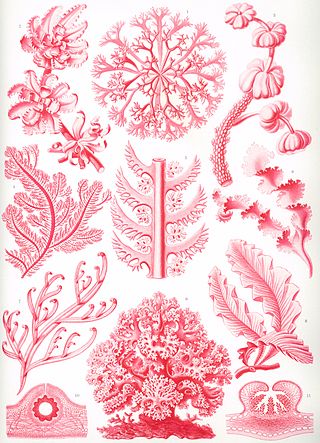Top Qs
Timeline
Chat
Perspective
Florideophyceae
Class of algae From Wikipedia, the free encyclopedia
Remove ads
Florideophyceae is a class of exclusively multicellular red algae.[3][4] They were once thought to be the only algae to bear pit connections,[5] but these have since been found in the filamentous stage of the Bangiaceae.[6] They were also thought only to exhibit apical growth, but there are genera known to grow by intercalary growth.[6] Most, but not all, genera have three phases to the life cycle.[6] In the subclass Nemaliophycidae there are three orders, Balbianiales, Batrachospermales, and Thoreales, which lives exclusively in freshwater.[7]
Remove ads
Classification

There are various classification schemes; see red algae. One option is to use the following:
Subclass Hildenbrandiophycidae
Subclass Nemaliophycidae
Subclass Corallinophycidae
- Corallinales
- Corallinapetrales
- Rhodogorgonales
- Sporolithales
The subclass Corallinophycidae was introduced in 2007.[8]
Subclass Ahnfeltiophycidae
- Ahnfeltiales
- Pihiellales
Subclass Rhodymeniophycidae
- Bonnemaisoniales
- Ceramiales
- Gelidiales
- Gigartinales
- Gracilariales
- Halymeniales
- Nemastomatales
- Peyssonneliales
- Plocamiales
- Rhodymeniales
- Acrosymphytales
- Atractophorales
- Catenellopsidales
- Sebdeniales
According to molecular clock analysis, Florideophyceae diverged from other red algae about 943 (817–1,049) million years ago. It split into Hildenbrandiophycidae ca. 781 (681–879) mya, Nemaliophycidae ca. 661 (597–736) mya and Corallinophycidae ca. 579 (543–617) mya, and ca. 508 (442–580) mya the split between Ahnfeltiophycidae and Rhodymeniophycidae occurred.[1]
Remove ads
References
External links
Wikiwand - on
Seamless Wikipedia browsing. On steroids.
Remove ads

